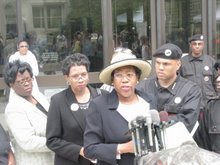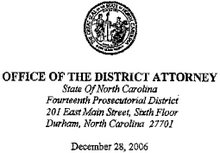Bill To Allow Unqualified Judges and DAs To Remain In Office Passes NC Senate
.
In its original form, the bill sought to provide an avenue of immediate relief by setting forth a procedure for the prompt removal of judges and district attorneys rendered unqualified by their disbarment. This week, the NC Senate unanimously approved a revised version of the bill that appears to extend the time that disbarred judges or district attorneys may retain their positions. In doing so, the new bill seems to have defeated its own purpose, as the time allowed may stretch well beyond the four months that Ethridge delayed his resignation
At the time the original bill was filed, we noted that it had implications for Durham County District Attorney Mike Nifong, whose anticipated disbarment appears likely to offer the first opportunity for the proposed law to be put to use.
“North Carolina State Senate Majority Leader Tony Rand (D-Bladen/Cumberland) and State Senator Eddie Goodall (R-Union/Mecklenburg) have co-sponsored a bill that will serve to ensure the removal of disgraced District Attorney Mike Nifong from office in the event that the State Bar disbars the defendant. Senate Bill 117, which was referred to the Senate’s Civil Judiciary Committee on Tuesday, proposes granting the governor the authority to remove from office a district attorney or judge, in the event that they are no longer authorized to practice law. The bill also sets forth an immediate suspension of their salary once disbarred.”When originally introduced on February 12, the bill, co-sponsored by State Senator Eddie Goodall (R-Union/Mecklenburg), read as follows:
§ 7A-410. Vacancy exists on disbarment.After passing through the Senate’s Civil Judiciary Committee and picking up three additional co-sponsors (Bob Atwater (D-Chatham, Durham, Lee), William Purcell (D-Anson, Richmond, Scotland, Stanly), and John Snow (D-Cherokee, Clay, Graham, Haywood, Jackson, Macon, Swain, Transylvania), the watered down bill now reads:
When a judge of the district court, judge of the superior court, judge of the Court of Appeals, justice of the Supreme Court, or a district attorney is no longer authorized to practice law in the courts of this State, the Governor may declare the office vacant. Prior to making such declaration, the Governor shall notify the justice, judge, or district attorney at least 10 days in advance of taking such action and shall afford the justice or judge the opportunity to be heard on the matter.
"§ 7A-410.1. Suspension of salary.
When a justice, judge, or district attorney has been disbarred or suspended from the practice of law under G.S. 84-28 but has not yet been removed from office, the salary of the justice, judge, or district attorney is suspended immediately. If the order of disbarment or suspension is reversed on appeal, the salary shall be paid retroactively from the date the salary was suspended."
§ 7A-410. Vacancy exists on disbarment.The revised bill continues to provide for the immediate suspension of salary for a disbarred judge or district attorney. However, allowing an unqualified judge or district attorney to remain in office until all appeals are exhausted, some of which may be filed up to one year following disbarment and others which have no clear time limitation other than “reasonable,” renders the bill useless as to its initial intent. Effectively, the revised bill will now do little, if anything, to provide for timely removal and replacement of officials who cannot lawfully function in their elected roles.
When a judge of the district court, judge of the superior court, judge of the Court of Appeals, justice of the Supreme Court, or a district attorney is no longer authorized to practice law in the courts of this State, the Governor shall declare the office vacant. Prior to making such declaration, the Governor shall notify the justice, judge, or district attorney at least 10 days in advance of taking such action and shall afford the justice or judge the opportunity to be heard on the matter. For purposes of this Article, the term 'no longer authorized to practice law' means that the person has been disbarred or suspended and all appeals under G.S. 84-28 have been exhausted.
"§ 7A-410.1. Suspension of salary.
When a justice, judge, or district attorney has been disbarred or suspended from the practice of law under G.S. 84-28 but the office has not been declared vacant under G.S. 7A-410, the salary of the justice, judge, or district attorney is suspended immediately. If the order of disbarment or suspension is reversed on appeal, the salary shall be paid retroactively from the date the salary was suspended."
Not surprisingly, State Senator Bob Atwater (D-Chatham, Durham, Lee), conveniently identified by the N&O as only representing Chatham County and not Durham, was pleased with the alteration that would conceivably allow a disbarred Mike Nifong to remain district attorney for his full term.
“Sen. Bob Atwater, a Chatham County Democrat, said one reason he liked the bill approved Wednesday was that it allows the lawyer to appeal his or her suspension or disbarment.” N&OIf as expected, Defendant Nifong is disbarred in June, and if the bill becomes law as it reads now, and if he delays the start of his appeal process for as long as the law allows, the time until his appeals have finally been exhausted could extend far beyond what remains of his four year term. Should that come to pass, and if Judge Orlando Hudson invents additional creative ways to delay acting on the statutory mandates of NCGS 7A-66, Durham County could be left without a functional district attorney from June of 2006 until January of 2010.














































5 comments:
Disgraceful. At least in Alabama, once an elected official is convicted of something that would disqualify that from holding their office, they're immediately removed from office. This is just sickening. I can see the retroactive pay, but given the relative rarity of disbarment, I think that an automatic removal from office is both fair and reasonable. Sad that even Alabama is ahead of North Carolina on this issue...
And Nifong gets his full 30 year pension - his goal when he started the frame. And since it's a pension, it can't be attached in the civil actions to come.
He's already mortgaged his house to pay for his lawyer. The families get nothing from him.
OJ all over again.
Svolich
The state of North Carolina will be the subject of students of scatology for decades to come. And, those scatologists will be able to prove the hypothesis that the subject of their study does, in fact, roll down hill -- From Easley, to Cooper, to Nifong to Gotleib.
The miasma of which the scatologist is so familiar seems to waft upward from the putrescently corrupt to the morally vacant and none in power in N.C. seem to be untouched by its contamination.
Mike in Nevada
And this is why I hate politicians from both parties. Right is right and wrong is wrong. For gods sake how can they mess this up?
And thus, residents of North Carolina have once again been 'cactus-jacked' by their elected state officials.
Is anything new?
D. Martyn Lloyd-Morgan
The Liberty Sphere
www.thelibertysphere.blogspot.com
Post a Comment